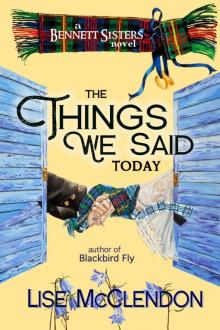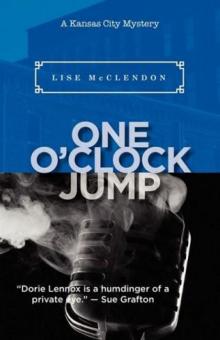- Home
- Lise McClendon
One O'Clock Jump Page 18
One O'Clock Jump Read online
Page 18
“You don’t have meetings?”
“Phone calls, that’s it. We have a track manager; he takes care of things. Or he’s supposed to.”
“What’s his name, this manager?”
“Vance Moore.”
Lennox would have written it down, but writing was out for a while. Instead, she repeated the name.
Wilson looked at her oddly. “You all right, miss? Need something for that hand?”
The pain waxed in a flash, as if gratified by the attention. Lennox winced and the old man trotted off somewhere. In a minute, he and a young woman were back with a towel full of ice. The woman clucked around, found a china bowl, set the towel and Lennox’s hand in it, and put the whole thing in Lennox’s lap.
“Thank you,” she said, trying to smile at them.
“This is Gertie,” Wilson said, nodding at the woman.
“His wife,” Gertie said, smiling. She looked half his age, dressed in a stylish shift, but with her dark hair long and straight, tied loosely with a ribbon. She was barefoot.
“Don’t know what I was thinking. Must’ve been the sun,” Wilson said, then smiled at Gertie.
“We met on a sailboat, back on Nantucket.” Gertie sighed. “And here I am.”
“Landlocked,” Lennox said.
Gertie and Floyd laughed. She grasped his hand, tapped his old chin lovingly, and skipped back to where she’d come from. Floyd watched her go for a long minute, as if she might disappear forever.
“Pretty girl,” Lennox said.
“Too pretty for an old codger. I know it.” He sunk into the red sofa. “Bought her all this new stuff. I hate it.”
“You’ve lived here long?”
“Most of my life. My father built this house just before he died. I moved in with my first wife forty years ago.” He looked around. “Great old place, isn’t it?”
“Beautiful. Your father must have been very … creative.”
“Rich, you mean?” Another sniff. “Started three banks. Two in Missouri, one in Kansas. Only one left now, but it’s enough.”
“Enough to start a racetrack from scratch.”
“Oh, that. Not my own money, and barely have half interest. And we got plenty of county bond money, you know.”
“So it’s leveraged. Is that what you call it?”
“Mortgaged, leveraged. We don’t own it outright. That’s foolish in business.”
“How so?”
“You don’t want to lose your shirt. Seen enough of that, haven’t we? So if the thing goes under, the bank ends up with it. I should know. We foreclosed on plenty of farms and businesses.”
“Is the loan through your own bank?”
“Of course. It’s my own personal loan.”
Sounded like he couldn’t lose. “And what bank is yours, Mr. Wilson?”
“First Missouri Savings.” He grinned. “You want to open an account? We welcome all, big or small. That’s our motto.”
Lennox put the bowl of ice on the floor. Her hand was numb now. “I know that bank. Downtown.” She smiled at Wilson. “Georgie Terraciano is one of your customers.”
Wilson blinked. “I don’t do day-to-day business anymore. I let Mr. Pitt take care of that.”
“You know him?”
“Terraciano? We’ve met.”
“Out at the racetrack?”
“No. At some society functions.”
“He doesn’t seem your type.”
“How clever of you, Miss Lennox.” He stood up; his stooped yet regal bearing was back. “I’m sorry I can’t help you with Palmer Eustace. I have to say, I’ve always been a little curious myself.” He led Lennox to the front hall. “Do you suppose it’s Dutch Vanvleet himself?”
Lennox smiled. “He is a sly one, isn’t he?”
On her way to Brookside, Lennox wondered where all this racetrack business was leading. Should she have mentioned the suitcase money to Floyd Wilson? The mysterious Palmer Eustace had her dander up. Was he a sham, an alias made up for the racetrack corporation? Was he Dutch Vanvleet’s alter ego? She was curious, yes, but was it important? What she needed was something on Iris, where she was staying, what she wanted. And who had contracted the midget to lean on her? The thugs were new to her, as was the midget, although his methods had been around the block a few times. Her hand throbbed inside the splint and she tried holding it at various angles, none of which helped the pain.
The Terraciano house was also brick, with a green lawn about an eighth the size of Wilson’s, manicured shrubs, and a large screen porch on the side. The Brookside neighborhood was respectable and proper, everything Georgie aspired to. His tots took their lessons from nuns; his wife had her own car and driver.
Lennox had stopped at a drugstore in Brookside to use the telephone, so she knew Marilyn was home and Georgie wasn’t. But the meeting would have to be short, as it was close to six now. The door was opened by a Negro housekeeper, a stout, bright-eyed woman. She let Lennox in, eyed her bad hand, and disappeared.
Dinner smells came from a far room. The hallway was small with a crystal chandelier and a vase of white roses. Marilyn came from the direction of the delicious smells, wiping her hands on a pink apron. She shooed Lennox into a den and shut the door. Not the first time clients had been embarrassed to be seen with her.
Mrs. Terraciano didn’t ask her to sit. She walked to the window overlooking the side yard, where two boys played on a swing set. “So what is it? What have you found out?”
Lennox leaned against the back of a leather chair. “The bank wouldn’t let me see all the accounts. Claimed that you had told them not to, but that, of course, was the other woman. They did show me your own checking account.”
“Did I make a mistake?”
“Two thousand dollars was withdrawn by bank draft two days before you tried to pay the school’s tuition.”
Marilyn looked sharply over her shoulder. “Who made the draft?”
“A bank official. He transferred the funds. So they probably went into another account.”
“One of Georgie’s, you mean. So he did it. He put the money in for me, then took it back out.” She marched to the small white fireplace and turned on her heel. Her eyes snapped with anger. “What now?”
“I don’t know if there’s anything that can be done about that, Marilyn. But if you want to know about the other accounts, you’ll have to go to the bank yourself. It’ll take some convincing that you’re the real Mrs. T., but if you have iden;tification, they should show you the accounts. They showed them to the other Mrs. T., so why not you?”
“The other—Who is this woman?”
“I’m working on that.”
“What’s her name?”
“She’s using bogus names now.”
Marilyn untied her apron, balled it up, and threw it into the leather chair. Her heels clicked across the wood floor as she went to a small walnut desk, pulled a checkbook from a drawer, and scribbled on a check. She handed it to Lennox. “There. Two hundred dollars. I know I’ve got that much in there. I want to know who she is, where she lives, what she wants.”
“Your husband is already paying me, Marilyn. It’s not necessary.”
“Take it.”
Lennox took the check, folded it into her pocket.
Marilyn crossed her arms, seemed to focus on Dorie’s bandages, then frowned. She turned toward the window and was quiet for a long minute. Then she whispered, “You have to go.”
Lennox walked toward the door. “I’ll call when I find out any more about her.”
“No.” Marilyn spun around. “I’ve changed my mind. I won’t need you anymore.”
Mrs. Terraciano stood stock-still, hands locked on the back of the leather chair. She pulled her eyes off Lennox, looking back at the children outside. Lennox saw that the anger had gone out of her. Outside, a boy played, a boy who must be Richard, the seven-year-old.
“I see.”
“Do you?” Marilyn said, her voice both hard and full of regr
et.
The Packard jumped the curb on Charlotte Street in front of Joe Czmanski’s garage. Marilyn’s turnaround was swift but understandable. No woman wants to know everything about her husband. Knowing what’s necessary for children, food, and shelter generally satisfies. Knowing too much can sour things, make love difficult, partnership impossible. Dorie’s own father had remained a mystery to her mother until the day he packed up his accordion and Jelly Roll Morton records and skipped town. Only then was it all too obvious that the man wanted more than children and Atchison and a WPA job sweeping the streets.
Joe stuck his scarred face out from the depths of the small garage. He was wiping his hands on a greasy rag as she kicked the car door shut with her foot.
“The old boiler sounds bad,” he said. “Want me to look at it? Do it for nothing, for you, Dorie.”
The pining in his voice cut her. Best not to take a hard look at Joe, with his hair gone and one side of his face scarred over from the explosion. Two years since the car blew up, everybody was used to his face. But still hard to take a close look.
“Look at those cars, they’re lined up waiting for you.”
“Let me look right now.” Before she could stop him Joe had the hood open and was poking around. Lennox slumped against the car. She shouldn’t be doing this. She had a million things to do, calls to make, notes to write. How was she going to report to Vanvleet tonight, with this hand?
She pulled herself up, holding the bad hand in the other. “I’m sorry, Joe, but I gotta go get this looked at.”
“It’s all right, Dorie. I know you got better things to do.”
“That’s not it, Joe,” she said, trying to explain. “My hand got—my fingers—” She stopped herself. “I’m sorry, Joe. I’ve got this date tonight.”
He was bent under the hood, fiddling, and said nothing as she backed away. She crossed the street, feeling like a shit, until the pain and the dirt and the heat got her.
In the boardinghouse, supper was being served in the dining room, with the radio playing. Everyone was bent over soup bowls, listening to “Jack Armstrong, AU-American Boy.” Jack would soon have to put away his football and pick up his gun. No one gave her a second look, or even a first.
She slipped through to the kitchen, where she chipped off a hunk of ice from the block in the icebox, wrapped it in a dish towel, and climbed the stairs. On the landing, she scrounged in her handbag for a nickel and dialed Vanvleet’s office. It rang without an answer. She slammed down the receiver and was glad. She wasn’t going to scour the city for him again.
With some difficulty, she unlocked her door. At least it was still locked. All she needed now was Iris to jump her. On the floor was a note from Mrs. Ferazzi in her crabbed hand under the heading Sunny Farms Chemical Fertilizer. “Working late. Meet me at the KC Club at nine, Harvey.”
She felt her shoulders sag. She’d have to retrieve the Packard from Joe, then drive it with the bad hand. Talbot couldn’t even pick her up. She crumpled the scrap of paper in her good hand. She had half a mind to stand him up. She shouldn’t be going dancing anyway, not while Amos was in the clink.
Angry, puffed skin poked out of the bandage. She contemplated unwrapping the gauze, taking a look at it, then decided she wouldn’t like what she saw. She lay back on her bed, set the hand on the chunk of ice in the towel, and tried to close her eyes. But every time she did, she saw that awful little man and his tiny hands and heard the sound of bones snapping.
Amos Haddam watched his lawyer and his oldest friend walk side by side into the cell. He blinked. There was a strange spot in front of his left eye. He rubbed it, but the spot remained. He slumped on the cot as they all said their howdy-dos.
Herb looked at him, squinting his eyes. “How’s my favorite limey holding up?”
“Don’t look at me,” Amos said. “I’m not Wallis Simpson.”
“Wallis is no limey.” Herb looked at Dutch Vanvleet. “Has his sense of humor at least.”
Dutch raised his eyebrows as if to say, He’s going to need it.
Amos felt he should stand up, but his legs felt like custard. “So who died?”
“Well, that’s the problem, Haddie,” Herb said, hooking thumbs in his belt loops. His uniform was so crisp, you could play table tennis on it. “Davy Esterly is dead.”
“We’ve been through this, haven’t we, old boy?” Amos said.
“Get on with it, Captain.” Dutch looked at the wall.
“All right,” Herb said. “We thought the bullet looked too big for your thirty-eight. Now they’re telling me it’s in a hundred pieces and they’ll be no matching it to any gun.”
“That’s good news, then,” Amos said. The pillow never looked finer.
“Not really. Because your gun was recently fired. Your car was at the scene. A man your size was there in the alley, running away from the dead man.”
“And you’ve got no alibi,” Dutch said.
“You’re some kind of counsel, counselor.” Amos looked at Herb. “That’s all you got, copper?”
Herb shrugged, rubbed his bald head. “It’s enough for the prosecutors. In the mood Chief Reed’s in.”
“Bloody rabid G-man,” Amos muttered.
“He should be in the hospital,” Dutch said suddenly, as if he’d just joined the party. “Your quack won’t even come up and look at him. Look at the back of his head, will you? He’s a sick man, and you know it, Captain. Put him in the hospital or charge him with something, but don’t just hold him here. It’s inhuman, and what’s more, illegal.”
Amos sat up straight. “That’s my boy. Yessir.”
Herb Warren looked at Dutch, then at Amos.
“What’s more,” Vanvleet continued, “he saved your life— how many times? Don’t forget that Kentucky moonshine raid, Captain, where the hillbillies came out of the hills with shotguns. Weren’t you covered with buckshot? Didn’t he drag you to the car, save your life?”
Amos dropped his head to his chest. “Don’t bring up ancient history, Dutch.”
“Chief Reed tells me the physical evidence is here,” Herb said. “I don’t have a choice. The arraignment is in the morning.”
Dutch Vanvleet jerked his briefcase off the floor and held it to his chest. Amos stared at him. Was this a new defense strategy—the temper tantrum? Vanvleet went to the cell door, motioned for the matron to let him out. He left without saying a word to his client.
Amos felt weak. “He thinks I’m fried.”
Herb frowned. “You okay? I’ll get that doc up here. I’ll lean on him. And it’s not that bad. It’s not over yet.”
Amos lay down on the pillow and shut his eyes.
“Do you know anything about Georgie Terraciano, Amos? Does he have it in for you somehow?”
“Gorgeous Georgie. Swell guy.” Amos smiled, his eyes still shut. “We’re pals. Nothing but pals.”
“Dorie thinks he’s tied in because of that joint the Chatterbox, and the dame she was following. The one who jumped.”
“But she didn’t jump. Lennox told me. She’s still alive. She’s going to find her.” Amos opened his eyes. “Herb?”
“Yeah?”
“I’m going to sleep now.”
Lennox jerked, shaking her head to clear the sleep. The ice had melted onto the bedclothes. She sat up in a panic, looking at her watch, then slumped back. She’d slept for only fifteen minutes.
Her dream clung to her. In it, Harvey Talbot was making love to her in a swimming pool. She floated in the water in the moonlight. His hands felt like moths fluttering, their soft wings searching, searching.
She stood up and stripped off her trousers and blouse, her socks, underpants, brassiere. She wrapped her mother’s old Chinese robe around her, difficult business with one hand. She felt filthy from the dumping by the willows, the trudging back to her car. She didn’t want to think about Harvey and how the night was now ruined. But still, she had to take a bath. She kicked Winkie Lambert out, ran water, and sank into it w
hile keeping the wrapped hand above water. As long as she didn’t touch it, bump it, or use it, the hand felt all right. Not good, but within the bounds of human endurance.
She was angry at herself, at her body, which had let her down again. If she were a man, she could have muscled out of the goon’s clutch, shot him in the foot, punched out that midget. Humiliating business there. She railed silently in the bath at crooked Georgie Terraciano and aloof Vanvleet, at Amos for leaving her to deal with everything alone, at Harvey for the damn note, at Hitler for the stupid war.
And Iris Jackson! That bitch. What the hell did she want?
By the time she got into her blue dress, fixed her hair, and put on a little makeup, she was too mad to put on stockings. Besides, she didn’t have any without tacked-up runs. And her hand made everything hard. She put on anklets, the bloomers, and scuffed shoes that she gave a quick spit polish.
She looked ready for dancing. But it was the last thing she wanted to do tonight.
EIGHTEEN
Driving downtown calmed the inner storm, so that Lennox had second thoughts about the anklets. Maybe she’d spring for a pair of stockings. She had tucked Lorna Hahn’s sketch of Iris into her bag, an ulterior motive as she parked near Emery-Bird-Thayer and climbed the steps into the department store.
The store was quiet, minutes to closing. Sweet perfume smells floated on the still air. Up the stairs, in Lingerie, Joyce and another saleswoman chatted over the cash register. Joyce looked up, surprised.
“Look at you! Got those bloomers on?”
The older woman, short and plump, let out a chuckle. Joyce explained about the dancing bloomers.
“Got a question for you ladies,” Lennox said, pulling out the sketch. “This is a woman who I think used to work here. Same one I mentioned earlier, Joyce. Do you recognize her now?”
The older woman sported an elaborate permanent wave on her graying hair. She pulled up glasses resting on her bosom in order to look at the picture.
“In this department? No, I don’t remember her,” the plump one said. Her name tag read clara. “Worked here twenty years. I think I’d know her if she worked here.”

 Blame it on Paris (Bennett Sisters Mysteries Book 7)
Blame it on Paris (Bennett Sisters Mysteries Book 7) Birds of a Feather: 3: Fly the Nest (Bennett Sisters Mysteries Book 16)
Birds of a Feather: 3: Fly the Nest (Bennett Sisters Mysteries Book 16) Blame it on Paris
Blame it on Paris The Things We Said Today
The Things We Said Today Bennett Sisters Mysteries Volume 5 & 6
Bennett Sisters Mysteries Volume 5 & 6 Bennett Sisters Mysteries Box Set 2
Bennett Sisters Mysteries Box Set 2 Painted Truth
Painted Truth One O'Clock Jump
One O'Clock Jump The Bluejay Shaman (Alix Thorssen Mystery Series)
The Bluejay Shaman (Alix Thorssen Mystery Series) Swing Town Mysteries Dorie Lennox Box Set
Swing Town Mysteries Dorie Lennox Box Set Give Him the Ooh-la-la
Give Him the Ooh-la-la Blackbird Fly
Blackbird Fly All Your Pretty Dreams
All Your Pretty Dreams Nordic Nights (The Alix Thorssen Mysteries)
Nordic Nights (The Alix Thorssen Mysteries)